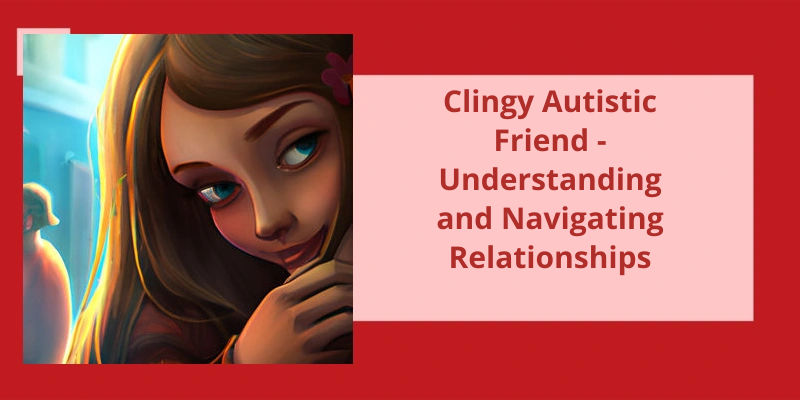It can often be difficult to navigate friendships, especially when one friend requires more attention and support than the other. When this dynamic is coupled with the complexities of autism, the situation can become even more complicated. As individuals on the autism spectrum may struggle with social cues and regulating emotions, they may unintentionally come off as clingy. This can be overwhelming for their friends, who may not understand their behavior or know how to respond. It’s important to approach these relationships with empathy and understanding, as both friends may have different needs and communication styles. With patience and open communication, friendships with clingy autistic friends can be fulfilling and rewarding for both parties involved.
What Is It Like Being Friends With an Autistic Person?
So what’s it like being friends with an autistic person? Well, for starters, it can be a unique and rewarding experience. Autistic individuals often bring a different perspective to the table and have a way of seeing the world that can be both refreshing and insightful. They may have certain quirks or behaviors that seem unusual to neurotypical individuals, but these can also be endearing once you get to know them.
One of the things that can be challenging about befriending an autistic person is that communication can be tricky at times. Autistic individuals may struggle with social cues or body language, which can make it difficult to understand what they’re trying to convey. However, with patience and understanding, it’s often possible to find ways to communicate effectively and build a strong bond.
Another thing to keep in mind is that autistic individuals may have sensory sensitivities that can impact their daily lives. This can mean that certain environments, sounds, or textures may be overwhelming or unpleasant for them. As a friend, it’s important to be aware of these sensitivities and try to accommodate them as much as possible.
Autistic individuals often have a deep passion for their interests and may be able to share this enthusiasm with you in a way that’s infectious. They may also be extremely loyal and committed to their friends, and you can count on them to be there for you when you need them.
It requires patience, understanding, and a willingness to embrace differences. If you can do these things, you may find that befriending an autistic person not only enriches their life, but yours as well.
Common Misconceptions About Autism and How to Address Them in Friendships With Autistic Individuals
This article explores common misconceptions about autism and how to approach them when developing friendships with people who’ve autism. It highlights the importance of understanding autism and the unique experiences of individuals with the condition, and offers practical tips for building strong relationships based on respect and empathy.
Now that we know that people with autism can become over-friendly and easily attached to others, it’s important to understand how this behavior can manifest and it’s impact on both the individual with autism and the people around them.
Do People With Autism Get Clingy?
This attachment is often due to their need for routine and structure in their lives. When someone with autism finds a person who provides them with a sense of order, they may become clingy or overly attached. This attachment can also be related to their intense focus on specific interests. For example, if a person with autism has a keen interest in trains, they may become fascinated with someone who shares their passion for trains, leading to a strong desire to be around them.
They may not understand when someone is uncomfortable or needs personal space, leading them to invade others personal boundaries. This lack of social awareness can cause them to behave inappropriately, which can lead to misunderstandings and social isolation.
Furthermore, people with autism often have a difficult time expressing their emotions, leading them to rely heavily on physical contact as a way of communicating their feelings. This reliance on touch can also make them appear clingy or overly attached. They may not understand that some people don’t like to be touched or that it isn’t appropriate to touch someone without their consent.
Despite the potential for clinginess, it’s important to remember that people with autism are individuals with unique personalities and abilities. Some may be more prone to attachment than others, while others may be naturally more independent. It’s also important to note that clinginess can be a symptom of other underlying issues, such as anxiety or depression, which may require additional support and treatment.
Watch this video on YouTube:
Autistic individuals have often been misunderstood and underestimated when it comes to their capability to feel and show affection. However, research and personal experiences have proven that they’re just as capable of love and romantic relationships as anyone else. In fact, being in a relationship with an autistic person can have it’s unique aspects that may surprise and enrich the lives of both partners.
Can Autistic People Feel Affection?
Studies have shown that individuals with autism spectrum disorder (ASD) are fully capable of experiencing and expressing affection towards their loved ones. However, the way in which they express their emotions may differ from neurotypical individuals. For instance, some autistic individuals may have difficulty interpreting social cues and body language, making it harder for them to express their feelings in a way that’s easily understood by others. As a result, it’s important for loved ones to be patient and understanding in these situations and to find alternative methods for communication.
It’s also important to note that not all autistic individuals have the same experiences with relationships and affection. Some may struggle with building connections due to difficulties with social communication, while others may have intense interests or obsessions that can make it challenging to connect with someone on a deeper emotional level.
It’s important to understand that autism is a wide spectrum and the experiences of individuals on the spectrum can vary greatly. While some may find it challenging to form close relationships, others may crave and thoroughly enjoy them. Let’s delve deeper into the complex relationship dynamics of people with autism.
Do Autistic People Crave Relationships?
Research suggests that those on the autism spectrum may experience difficulties in social interactions, including building and maintaining friendships and intimate relationships. For instance, individuals on the spectrum may exhibit limited communication skills, difficulty expressing emotions, or struggle with picking up on social cues that are critical in building bonds with others. This lack of social capacity can lead to feelings of loneliness and isolation, particularly for those who’re interested in forming meaningful relationships.
Given the wide range of experiences that people on the autism spectrum have in regards to relationships, it’s essential to encourage understanding and awareness of the nuances and complexities of this issue. For instance, individuals on the autism spectrum may have unique communication styles or require specific accommodations that can help them better navigate social interactions. Additionally, it’s important to promote the acceptance of diverse relationship styles and preferences, as some individuals may not wish to pursue intimate or familial relationships at all.
By promoting a more nuanced and understanding approach to this issue, we can help create a more inclusive and supportive society for everyone. By fostering a deeper sense of empathy and understanding towards those on the autism spectrum, we can help to build stronger and more inclusive social networks, promote greater emotional well-being, and allow people to lead fulfilling and happy lives.
Strategies for Building and Maintaining Relationships for Individuals on the Autism Spectrum
This article discusses different strategies individuals with autism can use to build and maintain relationships. It covers topics such as interpreting social cues, practicing communication skills, seeking support from peers or mentors, and finding common interests with others. By implementing these strategies, individuals with autism can form and enjoy meaningful connections with others.
Understanding the attachment styles of children with autism is crucial for parents and caretakers to provide the necessary support and interventions. Insecure attachment in autistic children can lead to behavioral and emotional difficulties, making it important to identify and address these issues early on. In this article, we will explore the different attachment styles and their impact on autistic children, as well as provide strategies for promoting secure attachments.
Are Autistic Kids Attached to Their Parents?
Autism is a developmental disorder that affects social interaction, communication, and behavior. It’s more common in boys than in girls, and the symptoms can range from mild to severe. One of the challenges of parenting an autistic child is understanding their attachment style. Research has shown that insecure attachments are linked to aggression and anxiety in children.
Despite the widespread misconception that autistic children are incapable of bonding with others, the reality is that most do form attachments. In fact, research has shown that only 47 to 53 percent of children with autism are securely attached, compared to about 65 percent of typical children.
It’s important to note that attachment theory isn’t a one-size-fits-all approach. Some may form secure attachments easily, while others may struggle. The degree of severity of the autism spectrum disorder can also impact attachment styles. Therefore, it’s essential to approach each case with an open mind and tailored interventions.
Attachment theory can help parents understand their childs emotional needs better and provide the right support to foster a healthy attachment.
However, this doesn’t mean that autistic children are incapable of forming strong emotional bonds with their parents. Early intervention, specialized therapies, and parental sensitivity can help autistic children develop secure attachments.
How to Identify Attachment Styles in Autistic Children
Identifying attachment styles in autistic children can involve observing their behavior, interactions with caregivers, communication skills, and social skills. This can help caregivers determine whether the child’s attachment style is secure, anxious-ambivalent, avoidant, or disorganized. It’s important to note that autistic children may display unique patterns of attachment due to their communication and sensory differences, and so it’s crucial to work with professionals who’ve experience in both autism and attachment theory.
Source: Infants’ interactions with parents may predict autism | Spectrum
Conclusion
As friends, it’s important to be patient, understanding, and compassionate towards them, while also setting healthy boundaries for ourselves. We should avoid labeling them or their behavior as negative, as it only perpetuates stigmas and stereotypes surrounding autism. Instead, we should celebrate their strengths, accommodate their needs, and acknowledge the value they bring to our lives.






